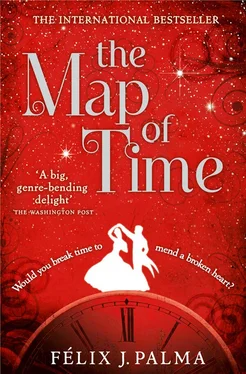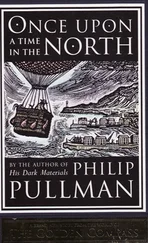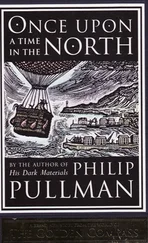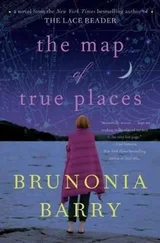Andrew did not understand enough about painting to discuss it with his cousin, and all he really wanted to know was the sitter’s identity, so he nodded gravely, giving his cousin to understand he agreed with his view that the artist would do better to devote himself to repairing bicycles. Charles smiled, amused by his cousin’s refusal to converse about painting – it would have given Charles a chance to air his knowledge – and declared: ‘I had another reason for giving it to him, dear cousin.’
He drained his glass slowly, and gazed at the picture, shaking his head with satisfaction.
‘And what reason was that, Charles?’ Andrew asked, becoming impatient.
‘The private enjoyment I get from knowing that my father, who looks down on the lower classes, has the portrait of a common prostitute hanging in his library.’
His words made Andrew reel. ‘A p-p-prostitute?’ he stammered.
‘Yes, cousin,’ replied Charles, beaming with content. ‘But not a high-class whore from the brothels in Russell Square, or even one of the tarts who ply their trade in the park on Vincent Street, but a dirty, foul-smelling draggletail from Whitechapel upon whose ravaged loins the wretched of the earth alleviate their misery for a few meagre pennies.’
Andrew took a swig of brandy. There was no denying that his cousin’s revelation had shocked him, as it would anybody who saw the portrait, but he also felt strangely disappointed. He stared at the painting again, trying to discover the cause of his unease. So, this lovely creature was a vulgar tart. Now he understood the mixture of passion and resentment that the artist had so skilfully captured in her eyes. But Andrew had to admit his disappointment related to a far more selfish logic: the woman did not belong to his social class, which meant he could never meet her.
‘I bought it thanks to Bruce Driscoll,’ Charles explained, pouring more brandy for them both. ‘Do you remember him?’
Andrew nodded unenthusiastically. Bruce was a friend of his cousin whom boredom and money had made an art collector; a conceited, idle young man who had no compunction in showing off his knowledge of painting at every opportunity.
‘You know how he likes to search for treasure in the most unlikely places,’ his cousin said, handing him his glass. ‘Well, the last time I saw him, he told me about a painter he’d dug up during one of his visits to the flea markets. A man called Walter Sickert, a founding member of the New English Art Club. His studio was in Cleveland Street, and he painted East End prostitutes as though they were society ladies. I dropped in there and couldn’t resist his latest canvas.’
‘Did he tell you anything about her?’ Andrew asked, trying to appear nonchalant.
‘About the whore? Only her name. I think she’s called Marie Jeanette.’
‘Marie Jeanette,’ Andrew murmured. The name suited her, like her little hat. ‘A Whitechapel whore …’ he whispered, still unable to get over his surprise.
‘Yes, a Whitechapel whore. And my father has given her pride of place in his library!’ Charles spread his arms theatrically in a mock-triumphant gesture. ‘Isn’t it absolutely priceless?’
With this, Charles flung his arm around his cousin’s shoulders and guided him to the sitting room. Andrew tried to hide his agitation, but could not help thinking about the girl in the portrait as they planned their assault on the charming Keller sisters.
That night, in his bedroom, Andrew lay awake. Where was the woman in the painting now? What was she doing? By the fourth or fifth question he had begun calling her by her name, as though he really knew her and they enjoyed a non-existent intimacy. He realised he was seriously disturbed when he began to feel an absurd jealousy towards the men who could have her for a few pennies when to him, despite his wealth, she was unattainable. And yet was she really beyond his reach? Surely, given his position, he could have her, physically at least, more easily than he could any other woman, and for the rest of his life. The problem was finding her.
Andrew had never been to Whitechapel, but he had heard enough about it to know it was dangerous, especially for someone of his class. It was not advisable to go there alone, but he could not count on Charles accompanying him. His cousin would not understand him preferring a tart’s grubby charms to what the delightful Keller sisters kept hidden beneath their petticoats, or the perfumed honey-pots of the Chelsea madams with whom well-to-do West End gentlemen sated their appetites. Perhaps he would understand, and even agree to go with him for the fun of it, if Andrew explained it as a passing fancy, but what he felt was too powerful to be reduced to a mere whim.
Or was it? He would not know what he wanted from her until he had her in his arms. Would she really be so difficult to find? Three sleepless nights were enough for him to come up with a plan.
And so it was that while the Crystal Palace (which had been moved to Sydenham after displaying the Empire’s industrial prowess) offered organ recitals, children’s ballets, ventriloquists’ acts and the possibility of picnicking in its gardens with dinosaurs, iguanodons and megatheriums reconstructed from fossils found in the Sussex Weald, and Madame Tussaud’s deprived its visitors of sleep with its famous Chamber of Horrors (in which madmen, cutthroats and poisoners huddled at the foot of the guillotine that had beheaded Marie-Antoinette), Andrew Harrington – oblivious to the festive spirit that had taken hold of the city – put on the humble clothes one of his servants had lent him, and examined his disguise in the cheval glass. He gave a wry smile at the sight of himself in a threadbare jacket and trousers, his fair hair tucked under a checked cap pulled low over his eyes. Surely, looking like that, people would take him for a nobody, possibly a cobbler or a barber.
Disguised in this way, he ordered the astonished Harold Barker to take him to Whitechapel. Before leaving, he made him swear to secrecy. No one must know about his expedition to London’s worst neighbourhood, not his father, not the mistress of the house, not his brother Anthony, not even his cousin Charles. No one.
Chapter III
In order not to draw attention to himself, Andrew made Harold pull up the luxurious carriage in Leadenhall, and continued alone on foot towards Commercial Street. After wandering a good way down that evil-smelling thoroughfare, he plucked up his courage and entered the maze of alleyways that made up Whitechapel. Within ten minutes, a dozen prostitutes loomed out of the fog to offer him a trip to Mount Venus for the price of a few pennies, but none was the girl in the portrait. Had they been draped in seaweed, Andrew might easily have mistaken them for faded, dirty ship’s figureheads. He refused them politely, a dreadful sadness welling up in him at the sight of those scarecrows, hunched against the cold, who had no better way to earn a living. Their toothless mouths, attempting bawdy smiles, were more repulsive than desirable. Would Marie look like that outside the portrait, far from the brushstrokes that had transformed her into an angel?
He soon realised he was unlikely to find her by chance. Perhaps he would have more luck if he asked for her directly. Once he was sure his disguise was convincing, he entered the Ten Bells, a popular tavern on the corner of Fournier Street and Commercial Street, opposite the ghostly Christ Church. When he peered inside the pub, it looked to him the sort of place whores would go in search of clients. As soon as he reached the bar, two came up to him. Trying to seem casual, Andrew refused their propositions as politely as he could and offered them a glass of stout. He explained he was looking for a woman called Marie Jeanette. One of the whores left immediately, pretending to be offended, but the other, the taller of the two, accepted a drink. ‘I suppose you mean Marie Kelly’ she said. ‘That dratted Irishwoman, everybody wants her. I expect she’s done a few by now and is in the Britannia – that’s where we all go when we’ve made enough for a bed and a bit more besides so that we can get drunk quick and forget our sorrows.’ She spoke with more irony than bitterness.
Читать дальше












